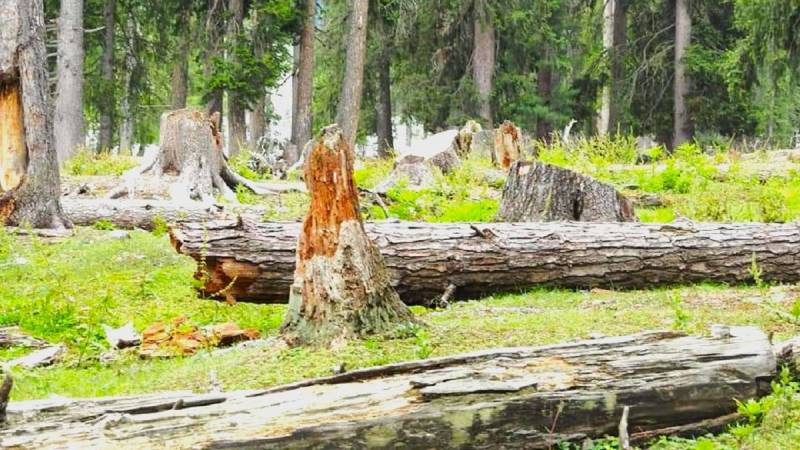
The scenic valleys of Swat, so often dubbed the Switzerland of the East, with high snow-covered mountains surrounded by pristine valleys of lush green pine forests and rolling meadows. But over a decade of terrorism and natural disasters in the form of floods have ravaged the economy of this district. As a result, many people have turned to capitalising on the valley's natural resources, irrespective of the macro impact it may have on the region's green character and economy. Deforestation, however, remains a highly divisive subject in the region.
Residents and experts say a widespread campaign of indiscriminate tree felling is underway in various regions of Swat, with trucks carrying timber a frequent sight on its highways. This has led to protests from residents, activists, and even the local business community.
The provincial forest minister has drawn a 'red line' on deforestation, imposing a blanket ban on tree cutting. But this has only deepened these fractures, giving rise to a new crisis in the Switzerland of the East.
Forest landscape of Swat
Data from the Swat Forest Department, obtained under the Right to Information Act 2013, shows that Swat has been divided into Lower Swat, Upper Swat, and the Kalam Divisions.
In Upper and Lower Swat, forests cover an area of 216,005 acres, with 148,729 acres declared protected forests and 67,275 acres declared communal forests. In the Kalam Division, there are 192,193 acres of protected forests and 5,683 acres of communal forests, for a total area of 198,976 acres.
Global Forest Watch claims that forests in Pakistan have been decreasing at an alarming rate of 4% per year over the past 20 years.
Experts claim that 30% to 40% of trees in various regions of Swat have already been cut down, and those involved in the process aim to raise this to 70% of trees in the district.
They pointed out that the issue began when the government, in the first phase, allowed those owning private forests to cut down trees. However, soon, trees were being felled in private and government-owned forests. When the government finally ordered to stop felling trees—whether on privately owned land or state-owned land—the orders were ignored by the timber mafia.
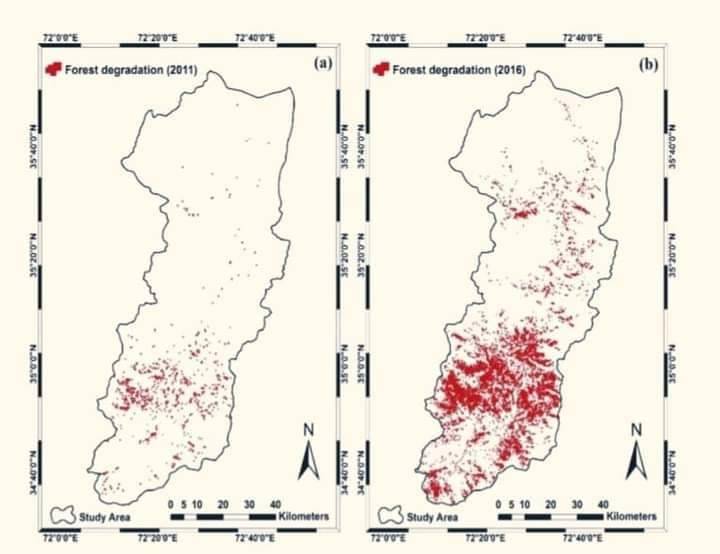
Local journalist Adnan Bacha told The Friday Times that several forests in Swat have been ruthlessly cut down in the past four to five months. Adnan Bacha said that the forest denuding process in the district saw valuable trees like the Deodar, Chinar and others cut down.
He estimated that between 500 and 1,000 trees are cut down across the district daily, with environmental experts estimating that more than 75,000 valuable trees have been cut down in just the past three months. Trees are being cut in various areas of the district, including Kalam, Bahrain, Madyan, Usho, Matiltaan, Khwazakhela, Matta, Barikot, Mahodand, Gabeen Jabba, Malam Jabba, Kabal, and others, he said.
These trees are then transported to various parts of Punjab to be turned into timber and other wood products.
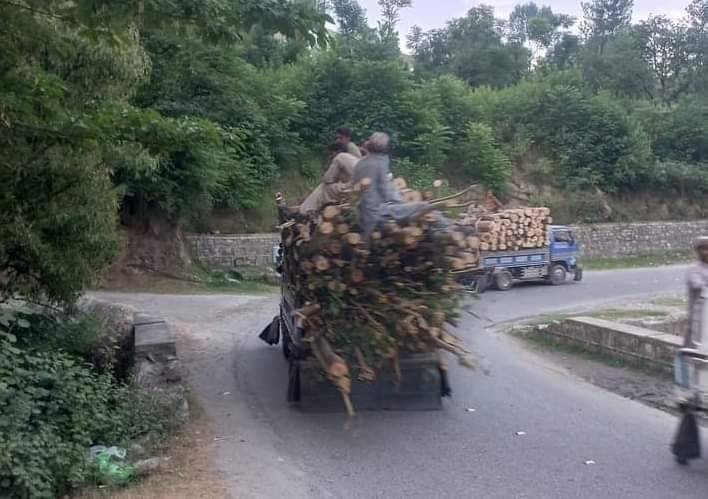
Bacha urged the government to ban cutting forests for a decade or two while planting trees to replace those lost in deforestation.
Deforestation, a divisive topic
The topic of cutting down trees is deeply divisive among the residents of Swat. The division arises from the needs of the poor versus the damage the deforestation causes and its precipitating effects which affect most residents of the region.
Muhammad Ikram, a resident of Swat who cuts trees, explained that he cuts down three to four trees from the nearby mountain every month to use it as firewood. Ikram said that in the absence of employment opportunities, he uses the wood to keep his hearth warm and his stove lit while any excess is sold.
Ikram said he was unaware of the harm cutting down a single tree could cause.
Similarly, Gul Muhammad, a local, said the government has failed to provide even the most basic amenities in his village, such as electricity and gas. Therefore, people in the area have no choice but to cut down trees to use as firewood to cook food and feed their families.
Apart from those who cut down trees for subsistence, there are those who cut them down for mere profit, and they form the majority of the timber mafia that operates in the northern, wooded areas of Pakistan.
However, a growing section of the local population has started to recognise the value that trees provide. They have become vocal against those who have been felling forests. Activists, civil society and the business community have staged protests against the felling of trees.
Protesting deforestation
Sajid Ali, a 35-year-old shopkeeper from Swat, told The Friday Times of his disappointment with the government's inability to stop rampant forest denudation. He claimed that it was unfortunate that the Khyber Pakhtunkhwa Minister for Forests and Environment hailed from Swat, but ever since he had taken charge of the department, they had witnessed an increase in tree cutting.
Ali noted that they had voted for the Pakistan Tehreek-e-Insaf (PTI) government with the hope that they would herald a net climate positive change. He lamented at the form of change they were witnessing on the hills of the valley. He added that during the successive tenures of the PTI, residents of Swat have been affected by terrorism, the novel coronavirus (COVID-19), and natural disasters. Instead of providing relief, he said the government was pushing them towards increased difficulties. Ali vowed that in the next elections, not only would he refrain from voting for the PTI, but also campaign against them and discourage others from voting for them.

Muhammad Bashir, a 45-year-old resident of Sheen Khwazakhela area in Swat, told The Friday Times that activities to denude forests in Lower and Upper Dir are continuing unchecked under the "Wood Lot" law. He claimed that dozens of trucks loaded with timber are being transported to other areas for processing daily.
Under the Wood Lot law, the forest department issue permits to individuals who have planted trees on their land to cut them down. However, Bashir claimed that These individuals, in collusion with officials from the forest department and the timber mafia, have been ruthlessly cutting down forests and selling them legally in different parts of the country. As a result, vast swathes of forests are being cleared at an alarming rate. If this continues, Bashir fears the forests in the Malakand Division will soon be depleted, and the area's natural beauty will be lost forever.
Climate activists and experts have long warned of the dangers posed by deforestation in the region, including the risk of increased frequency of landslides during heavy rains.
Environmental expert Akbar Zeb told The Friday Times that climate change is no longer a local but a global issue, and Pakistan's efforts to address it are negligible. Deforestation, he said, is a significant contributor to the effects of climate change. Looking at the floods of 2010, 2017, and 2022, he said it was clear that such floods have never occurred in the district's history. On the one hand, there is rampant deforestation in the Malakand Division and greenhouse gas emissions with rising water levels on the other. Additionally, land sliding is occurring with greater regularity at various locations in the hilly district.
Zeb stated that even though the mighty Swat River flows through the district, water scarcity is steadily growing in different parts of the Malakand Division. He predicted that future generations would face severe water shortages.
This year, the Provincial Disaster Management Authority (PDMA) has imposed an emergency in 11 districts of Khyber Pakhtunkhwa due to the risk of flooding. Climate change poses threats to tourism, business, food, and other sectors in the district.
Deforestation devastates Swat's peaks
Mountaineer and eco-tourism activist Azhar Uddin told The Friday Times that he was against cutting down trees in the forests of the Malakand Division, whether the government did it, the Forest Department under its "Wood Lot" policy or 'scientific cutting' (where trees are cut along scientific lines for the better health of trees) or by individuals or private groups. He explained that different districts of Khyber Pakhtunkhwa were already severely affected by climate change, while Pakistan was amongst the top ten countries in the world affected by climate change. Therefore, both legal and illegal felling of trees would only put Pakistan at greater risk.
One impact of climate change, Azharuddin mentioned, was that in recent years, the glaciers in Mankiyal had been melting at an increased rate, causing flooding, which had resulted in significant losses. He said the last time the melting glaciers caused flooding, the road from Kalam to Mankiyal had to be shut down for a month.
In the future, we cannot afford to bear such losses, he said.
Adnan Bacha stated that just like in other parts of the country, the effects of climate change have been acutely felt in Swat, with frequent floods, natural disasters, and a significant increase in temperature. He said that temperatures in Swat have risen by five to eight degrees Celsius in recent years. With this year's summer breaking records already, he warned that if this situation continues, Swat may face unintended environmental hazards in the near future.
Azharuddin said they have held protest demonstrations against the cutting of trees in different areas of the region and have even approached the Peshawar High Court on the matter. If nothing changes, he said they will organise a "million-man march". If that fails to move the government and the relevant authorities, he said that they will be forced to take matters into their own hands and physically stop the cutting of trees, even if it means getting arrested.
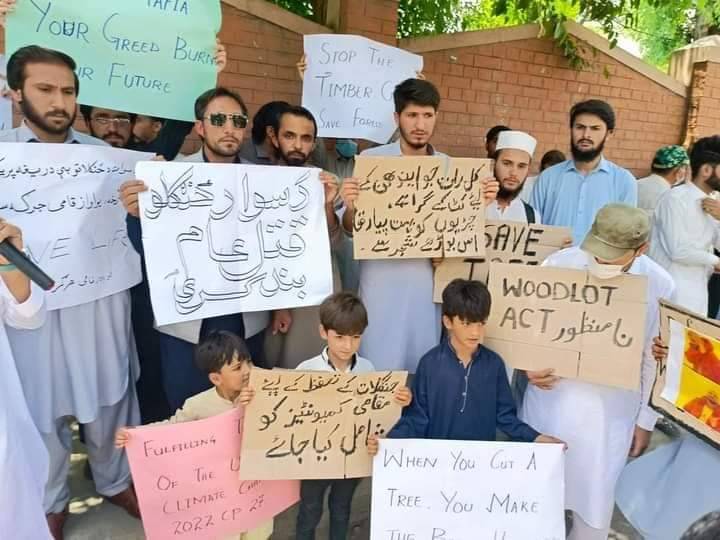
"We are against the Wood Lot Act and scientific cutting of the forest because every year they cut thousands of hectares of forest," Azharuddin said.
Curiously, owners of private forests are also staging protests against the governments decision to impose a blanket ban on cutting trees in the district. They are demanding permission to cut the down trees on privately held land to earn a livelihood.
Private forest owners want their timber
Private forest owner and Private Forest Owners Association President Alauddin Khan, who recently addressed a news conference in Swat demanding the government immediately lift the ban on cutting of trees in private forests, told The Friday Times that they do not recognise the latest restrictions imposed by the government on the scientific management of trees (scientifically trimming and pruning trees) and legal felling of trees. He called on the government to withdraw the unlawful order.
Alauddin said that the people of the Malakand Division, especially Swat, have been adversely affected by various natural disasters and terrorism over the past two decades and that they must be provided additional facilities, not deprived of existing ones. He expressed regret that due to the ban on cutting trees, they could not even cut dead and petrified trees in local forests. Instead, wood is being imported from countries such as America, Canada, and Malaysia to meet local demand, which was causing a loss to the national exchequer.
Alauddin Khan asserted they would not allow anyone to infringe on their rights. If the government does not consider their demands, they will take necessary action, including surrounding the Chief Minister and Governor's houses and staging a sit-in protest if required. He further asserted that they would not hesitate to take any measure to protect their rights and interests.
Climate change, and deforestation threaten tourism
Zahid Khan, the president of the Hotel Association in Swat and a key member of the Aman Jirga, told The Friday Times that cutting down forests not only causes flooding in the valleys but also results in numerous other unaccounted-for losses. He stated that the water level in the Swat River has risen by around four percent, which is evident from how the river floods the markets and hotels after rains.
The government, he stressed, should take timely action to safeguard public property against this. But, unfortunately, it has not happened yet.
Zahid claimed that the COVID-19 pandemic in 2021 caused a loss of Rs7.5 billion to the tourism industry in the district, followed by losses due to terrorism. Peace, however, was quickly restored after residents came out in force to timely condemn terrorism and force the government into action. But in the summer of 2022, the superfloods struck, causing a loss of Rs9.5 billion. Not only were hotel owners forced to shut down their businesses - like in the pandemic - owing to road closures, many hotels built far too close to the river were swept away. Now, in 2024, the government has failed to open the roads, and business and hotel owners have been forced to take matters into their own hands.
Swat Hotel Association President Zahid emphasised that tourism in the region remains in danger. With the shadow of military operations and floods hangs over the valley once again, the tourism potential of the region remains unfulfilled.
He said that while the government has been demanding more taxes and fees from them, it has also frozen the accounts of 75 hotels.
"What can we do in this situation?" he asked, adding that the situation for those involved in the tourism business in Swat is extremely critical.
Government fights back
Following protest demonstrations and social media campaigns against deforestation, Khyber Pakhtunkhwa (KP) Forests and Climate Change Minister Fazal Hakim Khan Yousafzai imposed a blanket ban on cutting down forests on June 25, 2024.
"All sort of forest harvesting operations and timber transportation shall stand halted till completion of already ongoing monitoring assigned to the Forestry Planning and Monitoring Circle vide this department's notifications," the notification read, adding that the ban shall remain in force until "further orders to safeguard forest protection and conservancy in the best public interest."
Legal felling of trees under the Wood Lot Act was also prohibited.
Provincial Minister for Forests and Environment, Fazal Hakeem Khan Yousafzai, told The Friday Times that the ban had been enforced due to the rampant cutting of forests and will remain in place until various teams are formed to monitor approved schemes.
The provincial minister stated that the ban on cutting forests has been imposed under the Private Wood Lots Rules 2017, after members of the public expressed concerns, and objections were raised on social media by activists.
Yousafzai said they have established committees to ensure transparency and accountability in the enumerating process, monitor approved working plans and other schemes, and prevent irregularities.
When asked, the minister assured that the public will be informed about the scientific method of cutting forests in a timely manner. He directed senior officials and staff of the forest department to monitor the process transparently and to utilise all available resources to ensure its success.
In addition to the ban, the provincial forest department has launched a crackdown against those cutting down forests.
In a recent news conference, Chief Forest Conservator Asghar Khan, Swat District Forest Officer (DFO)—Working Plan Unit Muhammad Waseem, and DFO Usman said that they had recently seen reports circulating on social media regarding trees being cut, mostly in private wood lots owned by individuals.
They assured that the government would take appropriate measures to protect the forests.
Later, while speaking to The Friday Times, Asghar Khan regretted that most reports going viral on social media mostly used old videos from the United States and Canada while claiming to be from Kalam and other areas of the district. He said the fake news created unnecessary and unhelpful hype around such a serious subject.
Data obtained through the Right to Information Act from the forest department showed that in 2023-2024, some 842 offenders were booked in Upper Swat Division, and fines worth Rs6 million were imposed. Additionally, 30 vehicles were impounded, and related suspects were punished for smuggling timber.
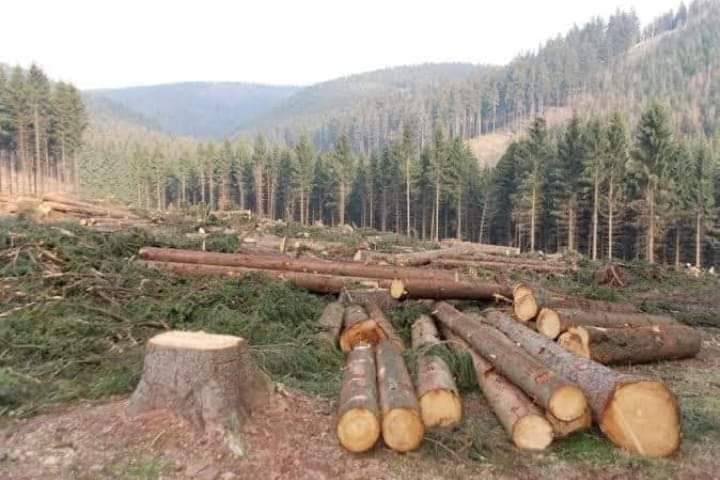
In the same period, some 57 offenders were booked in the Lower Swat Division, while fines worth around Rs5.9 million were imposed. Similarly, vehicles were impounded for smuggling timber.
In the Kalam Division, 30 offenders were booked during 2023-2024, with fines amounting to Rs27.7 million imposed. Furthermore, nine vehicles were apprehended for smuggling timber.
Unfortunately, the ban has not been effective in stopping the cutting of forests.
The imposition of a ban on deforestation and the prosecution of the timber mafia are good steps in the right direction. But further action, such as a ban on excavating the Swat River bed and construction in the middle of the river, and measures to combat future risks of flooding, is needed.

